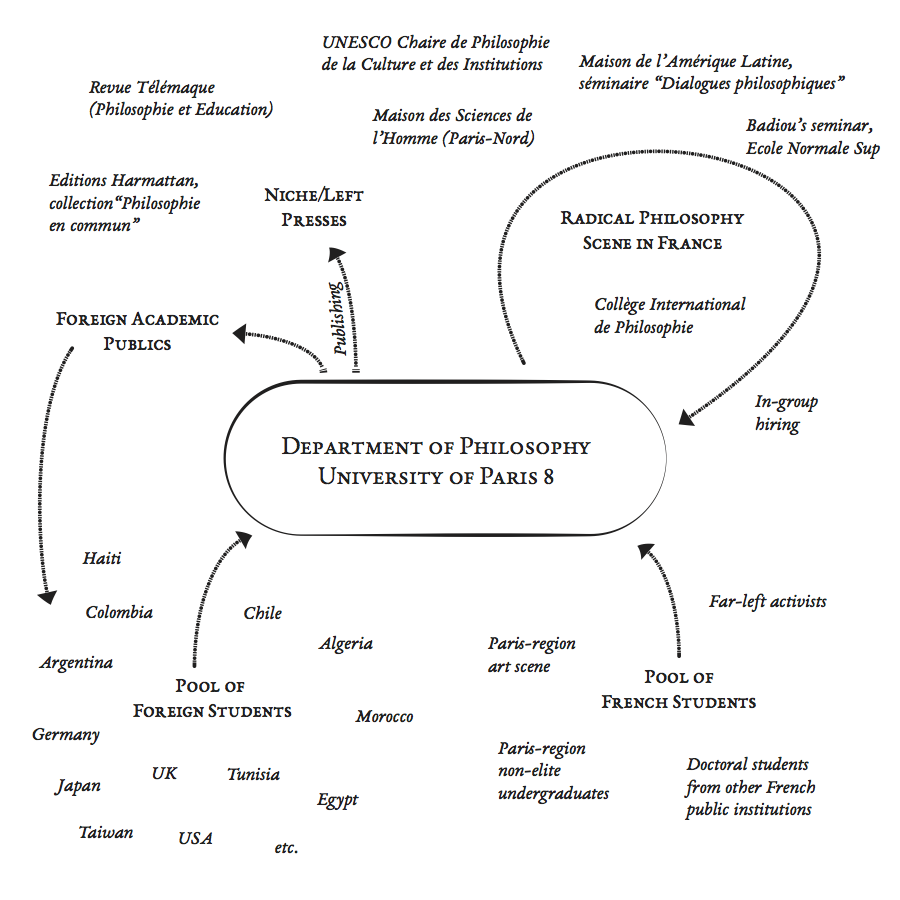In the 2010–11 academic year, the department had 30 teaching staff, of whom 18 were tenured professors (titulaires, tenured), 3 emeritus, and 9 temporary (doctoral students and part-time contract teachers). A sizeable majority were male (19 or 63%), and the vast majority were French by nationality. Other teachers’ nationalities included Haitian, Brazilian, and Croatian. Following the usual academic hierarchy in French public universities, they were divided by rank: 9 were senior Professeurs d’Université, 9 were junior Maîtres de Conférences (who were also tenured professors; there is no French equivalent of a tenure-track professorship), and the rest (emeriti aside) were various classes of temporary, visiting and doctoral-candidate teachers.[1] The Department did make some unusual efforts to level its hierarchies — everyone was invited to department meetings, even the students; and doctoral students sometimes taught master’s classes — but higher ranks still correlated with institutional power and better salaries.
Meanwhile, the Department’s own teaching staff came largely from Parisian philosophical radical circles, which were largely white, though also including some Middle Eastern, North African, and South American professors.[2] The minority of women professors were predominantly white French women. The more institutionally prominent professors held mainstream philosophical credentials (perhaps having graduated from the prestigious Ecole Normale Supérieure, or passed the traditional philosophy teaching exam, the agrégation). A secondary group of professors were basically “internal hires” who had been trained at Paris 8, former clients of Paris 8’s mandarins (notably Deleuze and Lyotard). Some of these internal hires traced back their past to the 1970s Vincennes campus, and most of these were palpably more marginal figures, lacking the habits of intellectual domination inculcated by traditional French philosophical training, and having especially non-canonical research interests. New professorial recruitment seemed to draw generally from a larger pool of Parisian philosophical radicals, such that most new professors were longstanding acquaintances (if not friends or former students) of the existing senior professors.[3]
The professors were nevertheless relatively homogeneous compared to the hundreds of students enrolled in the department’s numerous degree programs, which included a three-year License (undergraduate) program; a two-year Master program with several subtracks; a doctoral program; and at least ten collaborative programs with other institutions in France and abroad. Institutionally, the Philosophy Department was part of the University’s Arts Division (called a UFR, Unité de Formation et de Recherche), though its doctoral program and research funds were attached to a separate institutional entity called a “Laboratory” (LLCP, Laboratoire d’études et de recherches sur les Logiques Contemporaines de la Philosophie). The 3-year undergraduate program had 110 students (28% foreign, 46% women), and the doctoral program had around 250 students. (This was a major reversal from the Vincennes days: in 1977, undergraduate enrollment was 376, while the doctoral program had only 77.)[4]
While I do not have department-specific data on national identity, in the doctoral school that the department belonged to (ED 31), some 72% of doctoral students were foreign students, including 22% North African, 8% sub-Saharan Africans, 13.5% Latin American, and 7.8% Asian. The foreign majority was not, however, institutionally privileged. Only 6% of all doctoral students got financial support, and of this 6%, almost all fellowships went to French citizens, with only 7 of 48 fellowships going to foreign students over a three-year period (14.6%). Within the Philosophy Department in particular, 59.6% of all philosophy degrees during the past decade (2003–2011) went to foreign students — a stark contrast with the overwhelming Frenchness of the professors.
We might attempt to schematize the distinct publics and circuits of social exchange that kept the department in motion. In addition to the French art and politics scenes and the foreign student flows we have discussed, the Department’s professorial energies flowed largely into Paris-area collaborating institutions, like the low-fi, left-wing Harmattan Press, where the Department maintained its own book series, or the Maison d’Amérique Latine (Latin America House), where teachers like Patrice Vermeren were active in a longstanding “Philosophical Dialogues” seminar.

It was a diverse and highly differentiated space, and it was highly stratified and precarious as well.
-
In local institutional nomenclature, the senior academics were titled Professeurs des Universités; the junior academics Maîtres de Conférences; teaching staff reassigned from the secondary education system were Professeurs Agrégés (PRAG); doctoral student teachers were hired as Attachés temporaires d’enseignement et de recherche (ATER: a higher-paying post) or Moniteurs d’initiation à l’enseignement supérieur (lower-paying), although the moniteurs were replaced in Autumn 2011 by the new status of doctorant contractuel enseignant. Finally, the equivalent of adjunct teachers (who were generally required to hold outside employment as well, in a policy designed to preclude the formation of a large adjunct workforce) were designated Chargés de cours. ↩
-
Plínio Walter Prado was from Brazil; Mohamed Fashahi was Iranian-born; Zouzi Chebbi was from Tunisia. ↩
-
Not all teachers were, however, equally involved in the internal life of the Department, many withdrawing into their own research and teaching work. One graduate student divided the professors into four types: “the ones who do the work; the ones on Mars [sur la lune]; the assholes, and the ones who stopped having anything to do with the place.” ↩
-
“Contribution du Département de Philosophie à l’établissement du plan quinquennal de l’Université de Paris VIII,” June 1980, p.2. Personal archives of Charles Soulié. ↩